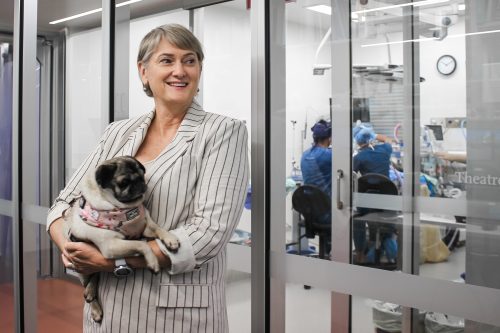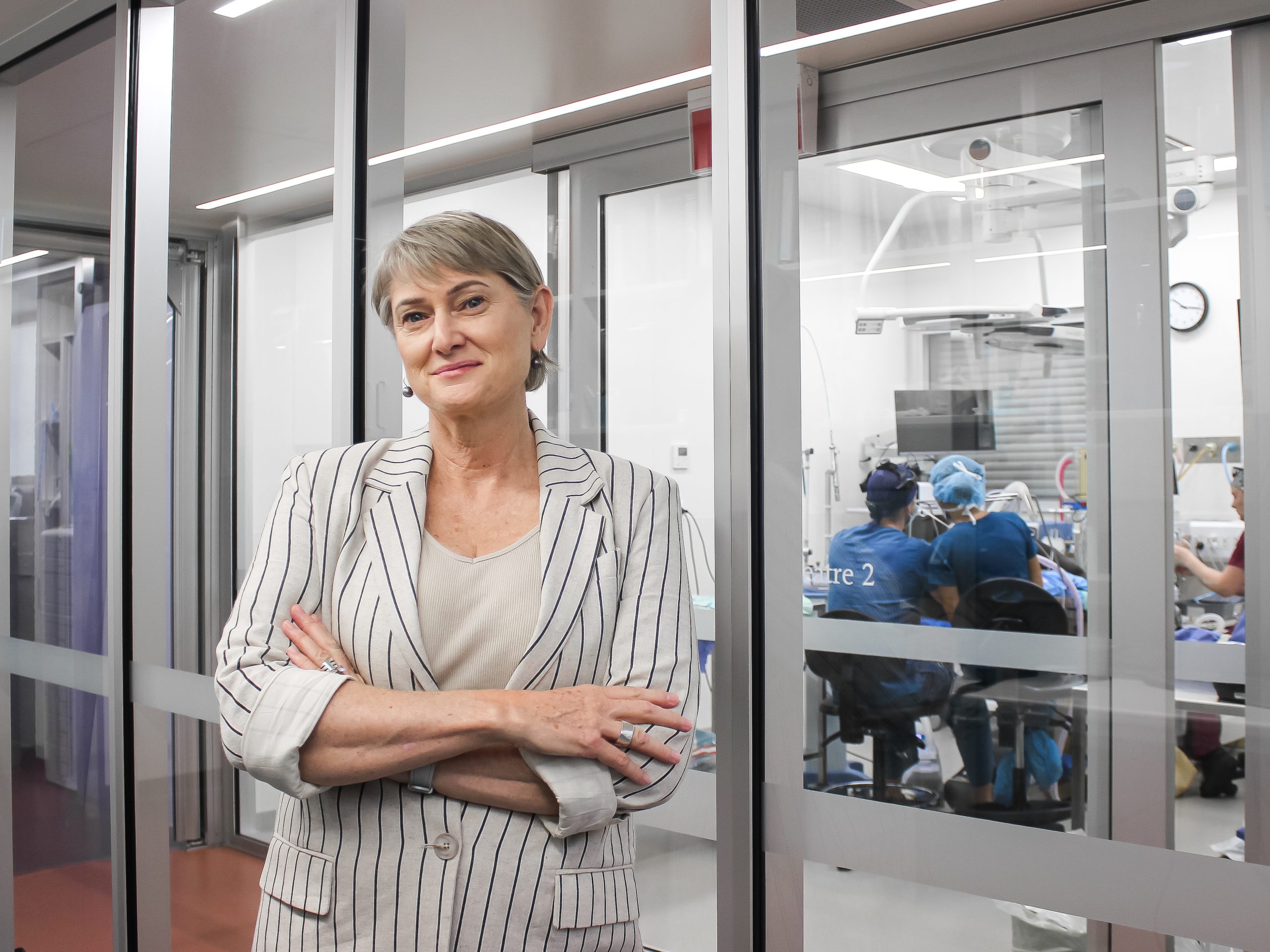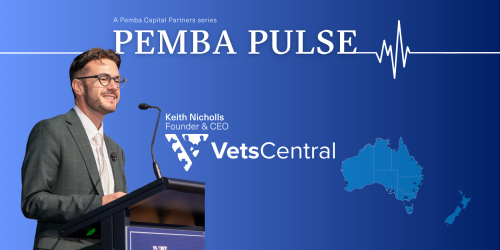Elle Solferini
Sterling Group is a dedicated network of specialty and emergency veterinary hospitals, committed to providing exceptional care in the veterinary industry. Born from the partnership between Queensland Veterinary Specialists and Veterinary Specialists Aotearoa, Sterling Group has evolved into a team of over 400 committed professionals, delivering world-class veterinary care across nine specialty areas.
At its core, Sterling Group thrives on a culture of collaboration, excellence, and compassion, setting the gold standard for veterinary care in Australia and New Zealand (ANZ). The group’s founding hospitals pioneered specialty veterinary treatments in their respective regions, and their commitment to innovation continues to propel the industry forward with cutting-edge techniques and clinical advancements.
Kristina Martin has been instrumental in the formation and growth of Sterling Group. As Chief Executive Officer, she has brought together a highly skilled team to advance specialist and emergency veterinary care. Under her leadership, Sterling Group has solidified its position as a leader in the field, delivering top-tier veterinary expertise and care to animals across Australia and New Zealand. This mission has been supported by Pemba Capital Partners, who partnered with Queensland Veterinary Specialists and Veterinary Specialists Aotearoa in 2023.
Join us as we delve into Kristina’s journey, her insights into the rapidly evolving veterinary sector, and her vision for shaping the future of specialty veterinary medicine.
Kris, you are a well-respected leader in the veterinary community. Could you walk us through some key milestones in your career and what led you to where you are today?
Growing up in cities around New Zealand, I always had an affinity for the outdoors and spent my summers working on farms while at University. I quickly learned to adapt to new situations whether it was cutting hay after a quick lesson on driving the tractor, digging drainage ditches, or helping rescue cows from perilous situations. My husband, who was a rural vet, often had me by his side during emergencies. When he moved to become a small animal vet in Auckland, I was there assisting with emergency surgeries and comforting both the owners and their pets.
Our journey took us to Australia for higher education, and then our careers took us to Germany, the US and Brussels. Embracing new situations and cultures became a way of life.
The highlight of my career came when we were back in Australia after 10 years offshore. I transitioned from 18 years in the legal industry to leading a highly respected specialist hospital in Brisbane for 7.5 years. I found my tribe and purpose in this incredible community of practical, down-to-earth, super smart, kind, and generous people.
A can-do attitude, respect, and genuine care for people and animals is part of my DNA and I believe it was one of the reasons why I was fortunate enough to be considered to lead and build the Sterling Group’s specialist and emergency hospital group across Australia and New Zealand.
You are currently CEO of Sterling Group, a network of Specialty Veterinary Hospitals across Australia and New Zealand including QVS and VSA. Why did QVS and VSA stand out to you? What attracted you to work with them?
QVS and VSA are both founding specialist veterinary groups in Australia and New Zealand respectively and bringing together these two industry leaders made sense for all involved. QVS and VSA both have a long track record of leadership, continuing to train the specialists of the future and are both incredibly closely aligned in their shared values and purpose with a genuine care for their people. As founders of specialty veterinary services in ANZ, innovation is in their DNA, constantly driving forward with leading edge treatments and clinical advancements for our patients.
For me, alignment of our values was the biggest attraction. Working hard is a given for me. Working hard and having fun with a team who are always thinking about how they can best support and grow each other for the benefit of our patients and those that love them was the major attraction.
Sterling Group is backed by Pemba Capital Partners, a leading growth investor with a track record in the healthcare sector including animal health. What has your experience been working with Pemba and how have they supported the growth of Sterling Group?
The partnership with Pemba works well as there is a mutual respect for each other’s expertise and experience. The Pemba team demonstrate in all their actions that they value and help preserve the great things that have been built across our hospital network while positively challenging and supporting us to do better.
The Pemba deal team have built an intimate understanding of our veterinary specialist and emergency business and are there when we need them, working collaboratively across the Sterling Group and with the Pemba Accelerate team. The Accelerate team bring their own expertise and leverage their network of experts as we build and improve the support office. And most critically, partner with us to develop innovative solutions as we seek to retain, recruit and grow our team of Specialists in a very competitive environment for talent.
How do you see the strategic merit of bringing together QVS and VSA? What benefit has the partnership brought to the hospitals?
Together we are stronger. A shared core value of collaboration brings benefits across the group. By sharing systems and expertise both the hospital groups benefit. They can leverage what has been built and don’t need to start from scratch to build this themselves. Sharing the cost of senior leadership across a larger group we have attracted in more experienced business leaders who are helping grow and develop our less experienced support office colleagues.
Our clinical leaders, who are highly respected in the industry, are forging connections and helping recruit talent into sister hospitals they trust to share our values and provide a supportive working environment. Specialists across the group are sharing their expertise, upskilling one another, and enabling each hospital to broaden its services.
We’re also creating more opportunities for our team, from expanded training programs to greater flexibility. A talented specialist nurse who might previously have left New Zealand is no longer lost to the group – they can relocate to one of our Australian hospitals, keep their benefits, and stay connected with the team. This level of collaboration and shared purpose is helping us grow stronger together, for the benefit of our people, patients, and the wider community.
How have you seen the specialty veterinary market evolve over recent years, particularly in ANZ?
Over the past decade, there has been a remarkable cultural shift -pets have gone from living in the backyard to sharing our bedrooms. This change reflects a growing expectation for human-level care for pets. However, providing specialist hospital services comes with significant costs, particularly in the absence of government subsidies. While the rise in pet insurance uptake has helped, many pet owners still find the cost prohibitive without insurance. This financial strain puts pressure on our specialists to maintain low costs and high volumes, which can take a toll on the wellbeing of our dedicated teams. In our industry, clinical teams face heightened psychosocial risks, making it essential for us to prioritise a culture of care across all our hospitals – a key focus for me and our leadership team.
The surge in demand for specialist services has driven an increase in the number of hospitals. However, the limited number of specialists in ANZ, coupled with the challenges foreign-trained specialists face in relocating to the region, remains a significant constraint on growth and a pressing challenge for the industry.
Despite these pressures, the care we provide is exceptional. Our state-of-the-art specialist hospitals across ANZ are equipped with human-grade technology, enabling pets to move seamlessly from problem to diagnosis to treatment without delays. The collaboration between multiple specialties under one roof ensures every patient receives the highest standard of care from a team of dedicated experts working together.
What is exciting you in the veterinary industry today? How do you stay ahead of industry trends in veterinary medicine and care?
It is an exciting time to be in the veterinary industry and especially at the cutting edge where our specialist teams are positioned. It is in the DNA of our veterinary professionals to be constantly learning and adapting how they provide patient care and they are constantly assessing what new methods, technologies and equipment they can use to benefit their patients. As business leaders we need to listen, learn and work collaboratively with our clinical leaders. Together, bringing both clinical and commercial expertise, we invest to ensure we maintain our market leading position and continue to attract and retain the best and brightest.
Providers of ancillary services in our industry are really leading the way with innovative solutions, and we’re working closely with them – advising and actively participating in their development.
Technology has already transformed human healthcare, and we’re seeing more and more of that flow into veterinary medicine. I think we’re on the cusp of an explosion in tech solutions that will help smooth out friction points for our referring vets, clinical teams, and pet owners. Specialised services like oncology, cardiology, and neurology are opening up even more advanced treatment options for our patients, and with AI advancements, I can see radiology services becoming much more accessible too.
I don’t know exactly how AI will change the day-to-day life of a specialist vet or clinical team – it’s hard to predict – but I’m confident it will, and we need to be ready for it. One thing is certain: AI will likely transform our support services even sooner than it revolutionises specialist veterinary care, which is an exciting shift to look forward to.
What are the biggest challenges that the industry is facing at the moment? Any tips on alleviating those pressures?
Attracting and retaining talent remains one of the most significant challenges in our industry. Many talented vets head to the US or UK to pursue specialist training and don’t return. Becoming a specialist is a long and demanding journey – it takes over five years for an experienced vet to complete a residency and qualify. Taking on residents is a substantial commitment, and the responsibility often falls on a small number of specialists. I believe the industry needs to collaborate more effectively to share the training load, alleviate pressure on those already providing training, and accelerate the growth of our locally trained specialist pool.
Additionally, addressing national barriers to entry for foreign-trained specialists is crucial. By lobbying to reduce these hurdles, we can attract top talent from overseas and help meet the growing demand for specialist veterinary care.
Providing specialist services comes at a cost, and maintaining the highest standards of care requires us to avoid compromising on pricing. The challenge lies in striking a balance – keeping prices accessible for most pet owners while ensuring uncompromised quality. Across the industry, there’s excellent work being done to educate pet owners on the real costs of veterinary care and to promote the importance of pet insurance, which can play a vital role in making specialist care more accessible.
The veterinary profession attracts deeply compassionate individuals who give so much of themselves to every patient. Tragically, our industry faces suicide rates four times higher than the general population. Efforts like Sophie’s Legacy and Not One More Vet are doing incredible work in educating the public about supporting vets and treating them with respect. As an industry, we must continue to create sustainable work environments that prioritise wellbeing and honour the dedication of our teams.
At Sterling Group, we are deeply committed to a People First philosophy. We are dedicated to genuine care and continuously improving the employment experience for our team, ensuring that their wellbeing is at the heart of everything we do.
What is your approach to retaining and attracting top veterinary talent, especially with the growing demand for specialised veterinary services?
There is no magic bullet. Exceptional professionals are drawn to high-performing environments where they can deliver quality care while enjoying the camaraderie of a supportive team. Investing in state-of-the-art hospitals and centres of excellence that enable advanced treatment options is critical to creating such an environment. Our approach to recruitment and retention is guided by shared values, and we are proactive in helping individuals transition out quickly if they aren’t the right fit.
We focus on building a leadership team that does the basics really well. This means leaders who actively listen, understand the evolving career and personal needs of our people, and provide the flexibility required to meet those needs. Our leadership team is approachable, responsive, and adaptable – focused on reducing friction points and ensuring our high-performing teams have the training, tools, and support they need to thrive. By creating a foundation of strong leadership and fostering a culture of excellence, we enable our teams to consistently deliver their best.
Thank you for joining us on this journey with Sterling Group. As Kristina Martin, CEO, emphasises, “Together we are stronger.”
If you are passionate about advancing veterinary care or want to learn more about Sterling Group, reach out to elles@pemba.com.au




